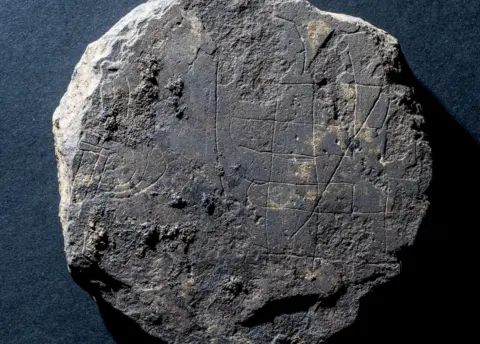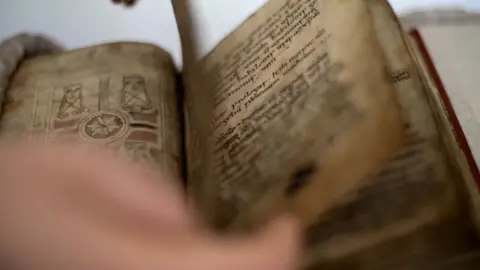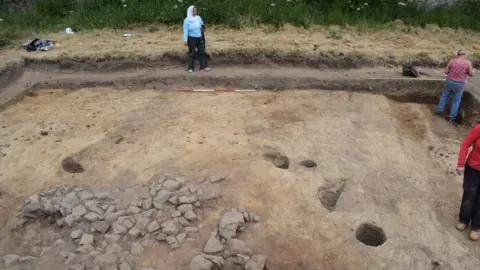Medieval gaming board clue to lost monastery
 Michael Sharpe
Michael SharpeThe discovery of a medieval gaming board may have helped bring archaeologists closer to confirming the site of a lost early monastery.
Archaeologists have been actively seeking the Monastery of Deer in Aberdeenshire since about 2008.
Monks at the monastery wrote the important 10th Century illuminated manuscript, the Book of Deer.
Layers beneath the disc-shaped stone gaming board have been carbon dated to the 7th and 8th centuries.
Charcoal also found at the remains of a building uncovered by archaeologists during the latest dig at the site, near Mintlaw, has been dated to the same time, between 669 and 777AD.
'Star find'
While earlier than when the Book of Deer was being written, archaeologists said the dates show there was activity at the site in the lead up to that time.
Anne Simpson, of the Book of Deer Project, said: "The rare gaming board was the star find of the dig, but it's the carbon dating which really thrills me, being so tantalisingly close to the period of the monastery."
 BBC Alba
BBC Alba Mark Hall, of Perth Museum and Art Gallery and a specialist in medieval games, said motifs cut into the stone suggest the board was used for playing a group of medieval games popular in Scandinavia and Ireland.
He said: "The seventh to eighth century radiocarbon determination for the layers beneath where the disc was found offer a rich temptation for assigning the piece to the early medieval monastery, but this temptation remains just that until further evidence presents itself to make a valid link between the disc and the date."
 Cameron Archaeology
Cameron ArchaeologyBruce Mann, archaeologist for Aberdeenshire Council, said: "The whole aim of this long running project has been to identify the remains of buildings where the original Book of Deer could have been written.
"This radiocarbon date excitingly places at least one of the newly excavated structures in the 8th Century AD."
Oldest Scottish manuscript
He added: "While this is earlier than the 10th Century writings, it still provides the first confirmed evidence of any activity before the 13th Century.
"I genuinely think we're close to solving this long standing mystery."
Ali Cameron, archaeologist for the Book of Deer Project, said work had begun on raising funds for further digs.
The Book of Deer is widely believed to be the oldest surviving Scottish manuscript, and is noted for containing the earliest surviving Gaelic writing from Scotland.
